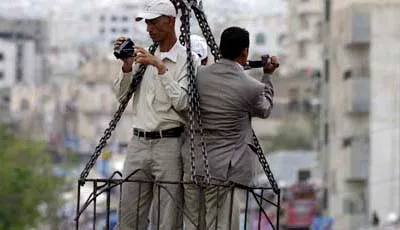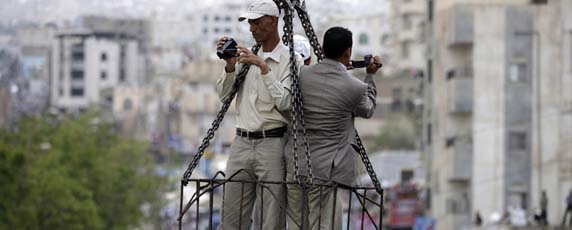
Technology has democratized news publishing, rattling regimes that see their survival dependent on control of information. Video footage of repression from Burma to Syria to Egypt dramatically illustrates the benefits of Internet platforms and social media. Yet the Arab uprisings of 2011 also demonstrate the urgent need for providers and users of digital tools to understand the dangers of deploying them in repressive nations. As threats to online journalists grow in scope and frequency, they also underscore CPJ’s mandate to be a truly global organization. More journalists need CPJ’s help than ever before. By Sandra Mims Rowe
Preface
By Sandra Mims Rowe
Blogger Rami Nakhle leaned across the table toward a cluster of U.S. technology leaders. “People are tortured to death because their Facebook account is hacked. You can make a difference between life and death,” he told the Silicon Valley executives and computer engineers representing Facebook, Google, and other companies.

Nakhle explained how he and his friends had been using the companies’ software to smuggle video footage and news out of Syria to reporters across the world. Then he described the security bugs that enabled the authorities to track and torture them.
This was one of many dramatic moments during a September conference CPJ convened in San Francisco to connect the technology community with the journalists who risk their lives to report from some of the most restricted countries in the world. These journalists find themselves empowered by the digital explosion at the same time they are endangered by technological changes, both designed and unintended, that expose them to repressive forces.
“They are brave enough,” Nakhle said of the journalists. “They know why they are taking these risks. With a small investment in their security, you can save many lives,” he told the group.
Technology has democratized news publishing, and it has rattled regimes that equate survival with control of all aspects of society, especially the flow of information. Video footage of repression from Burma to Syria to Egypt dramatically illustrates the benefits of Internet platforms and social media. Only a few years ago, much of this footage could not have been recorded easily and would never have been allowed out of a restricted country. Yet the Arab uprisings of 2011 also demonstrate the urgent need for providers and users of digital tools to fully understand the dangers of deploying them in repressive nations.
As the threats to online journalists grow in scope and frequency, they also underscore CPJ’s mandate to be a truly global organization. More journalists need CPJ’s help than ever before. Because many of these online journalists are freelancers or work for small, local news outlets, they do not have the resources of large institutions behind them. They often lack the experience and training they need to minimize risk. Today, about half of the journalists imprisoned worldwide work primarily online.
Authoritarian states can, and do, buy communications surveillance and filtering equipment from Western manufacturers. While such equipment may have been intended for law enforcement to combat terrorism or organized crime, its uses have spread well beyond that. In much of the world, the enemies of free speech are monitoring journalists and bloggers, filtering online content, and attacking news websites.
During the popular uprising in Syria, authorities dragooned Internet experts into working for the regime. The government-aligned hacking group known as the Syrian Electronic Army targeted critical press outlets and sought to undermine online reporting deemed harmful to authorities. Supplementing the old-fashioned beatings used to secure the names of colleagues and sources from journalists, the digital “army” has employed the phishing of Facebook pages to dupe people into providing passwords and identities.
In November, just days after CPJ awarded its International Press Freedom Award to the founder of the Mexican weekly Ríodoce, Javier Valdez Cárdenas, the publication’s website was forced offline by a denial-of-service attack. Ríodoce is one of the few publications in the region to report on drug trafficking. Even clearer was the message sent by the murderers of Mexican journalist María Elisabeth Macías Castro, whose mutilated body was accompanied by a computer keyboard and a cardboard placard stating her online pseudonym and threatening others who use social media to report the news. Macías’ murder in September was the first case documented by CPJ worldwide in which a journalist was killed in direct relation to reporting done on social media.
CPJ is recruiting the people and acquiring the knowledge to defend online journalists. In 2010, CPJ hired Danny O’Brien as its first Internet advocacy coordinator. O’Brien, based in San Francisco, organized the September meeting between journalists and Silicon Valley technologists. The conference was the first in what will become many efforts by CPJ to act as a bridge between Silicon Valley and the journalists who depend on their products–not only to get the news out, but also to protect them and their sources from physical harm.
While the Internet has provided the equivalent of a printing press to millions of people across the world, it has also broadened the power to shutter those presses. Technology is allowing journalists to slip the chains of censorship, but that newfound freedom will be fleeting if not defended. CPJ is leading the way.
Sandra Mims Rowe is chairman of the Committee to Protect Journalists.
